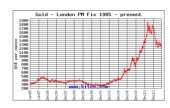 Early this month the price of gold dipped briefly below $1,200 an ounce. Since then it has risen, not all that dramatically but more-or-less steadily, and it is as I write above $1,240.
Early this month the price of gold dipped briefly below $1,200 an ounce. Since then it has risen, not all that dramatically but more-or-less steadily, and it is as I write above $1,240.
The latest move may have a lot to do with the Swiss vote on gold scheduled for the end of November.
Specifically, the people will vote on a question put forward by three members of parliament, and endorsed by the necessary 100,000 petitioners.
A “yes” vote will mandate the repatriation of foreign-held gold owned by the Swiss National Bank; a moratorium on future gold sales by the SNB; and a 20% gold reserve requirement. That last is the big one: it means 20% up from the present gold reserve of 7.7%.
Lawrence Williams, writing for Mineweb.com, estimates that a Swiss move to a 20% gold reserve would require the purchase of 1,650 tons of the stuff, putting “a rocket under the gold price, even if phased in over several years.”
“Yes “In The Lead
Early polling shows that “yes” is in the lead: 53% of those polled say either that they would vote “yes” or that they are leaning that way. The combination of firm “no” and leaning-toward-no is only 44%, leaving 3% with “keine angabe.”
The SNB itself and the Swiss government oppose the referendum. The parliament has officially declared that “gold no longer has any meaning for monetary policy.” But of course the anti-establishment nature of the petition is the whole point. If parliament were on board, the referendum process would have been unnecessary.
Back in September 2011, the central bank promised to buy foreign currencies (specifically euros) as vigorously as necessary in order to keep the value of the Swiss franc low, which of course is the natural impulse of central bankers working within an exporter-dominated economy. The 20% reserve requirement would put a considerably constraint on its ability to pursue that policy.
That, too, is the point. Not everyone is an exporter, and that monetary policy has fed popular resentments.
A Bear Market Sale Remembered
This coming vote also represents popular unhappiness with the Swiss government’s bear-market sale of half of the country’s gold reserves between 1999 and 2003, a period when gold was selling for between $300 and $400.
As the above chart, from Kitco, indicates, gold’s historical highs coincided with the worst of the euro-crises, in 2010-11. The world price got as high as $1,800. It has come down a bit from those gold ol’ days, as the sense of crisis has receded, but the resentment at that low-ball sale of more than a decade ago remains, and that is what the advocates of a “yes” vote have tapped into here.
Unfortunately, the Swiss Parliament is in line with the views of most legislatures around the world these days when it dismisses gold as an irrelevance, a relic. And there is room for populist rebellion against that presumption in many contexts, far away from the Alps.
Back in 1978, when the Swiss were known as the hard-money country par excellence, holding out against a world of inflationists, Prof. James Tobin of Yale University gave an address on international monetary reform. He observed that some years had already passed since the formal demise of the earlier, gold-tied, Bretton Woods system, and that the new world in which everyone’s money floats against everyone else’s was creating a sense of nausea. He said further that some economists share “the nostalgia of men of affairs for the gold standard or its equivalent, for a fixed anchor for the world’s money, for stability of official parities.”
Indeed, the very existence of this referendum, the number of signatures on the petition, and the early polls alike indicate that there are many in Switzerland who share that desire for a fixed anchor, and that perhaps the economists and central bankers of the world ought to learn to listen to the intuitions of men and women of affairs.
In the meanwhile, a speculative play on the outcome of this referendum would be a natural play. That of course entails risk: as the recent referendum on Scottish independence shows, the establishment has considerable armory with which to oppose such a boat-rocking exercise. Still, it is a natural play and some are surely placing it as I write.



